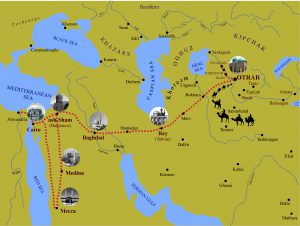AL-FARABI: LIFE AND WORK
 |
| The ancient city of Otrar was located on the territory of modern southern Kazakhstan at the confluence of the river Arys with the Syr Darya. The Otrar oasis, located at the joint of the nomadic steppe with a settled agricultural population, at the fork of the most important trade routes after the Arab conquest, became known as Farab district. In this blessed land in 870 the great thinker of the East al-Farabi was born. Al-Farabi’s full name is Abu Nasr Muhammad ibn Muhammad ibn Tarkhan ibn Uzlag al-Farabi at-Turki. The word “tarhan” in his name indicates that the philosopher belonged to a privileged family, and the phrase “at-Turki” proves that al-Farabi was a Turk by origin.
A few biographical data about al-Farabi came to us thanks to the writings of medieval authors: “Sources of information about the classes of doctors” Ibn Abi-Usaybiya, “Messages about scholars and sages”, authored by al-Kifti and “Dates of deaths of famous people and information about sons of time” Ibn Khallikan. In his youth, al-Farabi had the opportunity to get acquainted with the treasures of the richest at that time, the second in the world in the number of books and manuscripts (after the famous Alexandria book depository) of the Otrar library. Probably since then an unquenchable thirst for knowledge had awakened in him. Al-Farabi, a young man of twenty, is leaving his homeland in search of knowledge and rushing to the Middle East. His goal was to visit the largest centers of intellectual and cultural life of the Arab Caliphate, such as Baghdad, Damascus, Cairo, Aleppo, and others. After long journeys, al-Farabi settled in Damascus, where he enjoyed the favor and respect of the ruler at the time Safe Ad-Daul ben Hamdani. As a true sage, al-Farabi needed a minimum of comfort and privileges, spending most of the day writing his treatises or having wise conversations by the pool or in a shady garden. Al-Farabi died in 950 at the age of eighty and was buried in the “cemetery of kings” Bab as-Sagir in Damascus. According to legend, the ruler himself read the prayer on him on four papyruses. Al-Farabi left behind a rich cultural heritage. |
| Heritage |
| Al-Farabi. The dialogue of East and West |
| Aphorisms of al-Farabi |
| World scientists about al-Farabi |




